calsfoundation@cals.org
Ernest Gideon Green (1941–)
Ernest Gideon Green made history as the only senior of the Little Rock Nine, the nine African-American students who, in 1957, desegregated Central High School in Little Rock (Pulaski County). The world watched as they braved constant intimidation and threats from those who opposed desegregation of the formerly all-white high school. Green’s place in Arkansas’s civil rights history was solidified when he became the first African American to graduate from the previously all-white Central High School.
Ernest Green was born in Little Rock on September 22, 1941, to Lothaire and Ernest Green Sr. Green has two siblings: one brother, Scott, and one sister, Treopia Washington
An active member of the community from an early age, Green regularly attended church and was involved in the Boy Scouts, eventually becoming an Eagle Scout. He was a student at Dunbar Junior High School until he transferred to Horace Mann the year before volunteering to integrate all-white Central High School. Green persevered through a year of daily harassment by some of his fellow students to become the first black Central High graduate on May 27, 1958. Sitting with Green’s family at the event was Martin Luther King Jr., who attended the graduation virtually unnoticed. In an interview, Green said, “It’s been an interesting year. I’ve had a course in human relations first hand.”
After graduating from Central, Green attended Michigan State University, earning a BA in social science in 1962 and an MA in sociology in 1964. Afterward, Green served as the director for the A. Philip Randolph Education Fund from 1968 to 1977. He then was appointed as the Assistant Secretary of Labor during the Jimmy Carter administration from 1977 to 1981. In 1987, Green joined Lehman Brothers, an investment banking firm in Washington DC, where he is currently a Senior Managing Director. He has served on numerous boards, such as the National Association for the Advancement of Colored People (NAACP) and the Winthrop Rockefeller Foundation.
In 1958, Green—along with other members of the Little Rock Nine and Daisy Bates—was awarded the prestigious Spingarn Medal, which is presented annually for outstanding achievements of African Americans by the NAACP. In 1999, President Bill Clinton presented the nation’s highest civilian award, the Congressional Gold Medal, to the members of the Little Rock Nine. He is married to Phyllis Green, with whom he had a daughter, in addition to two children from a previous marriage. Green is the subject of a Disney movie called The Ernest Green Story, produced in 1992 and starring Morris Chestnut and Monica Calhoun. In 2011, Green was awarded an honorary doctorate by the University of Arkansas (UA) in Fayetteville (Washington County).
For additional information:
Bates, Daisy. The Long Shadow of Little Rock. Fayetteville: University of Arkansas Press, 1986.
Beals, Melba Pattillo. Warriors Don’t Cry: A Searing Memoir of the Battle to Desegregate Little Rock’s Central High School. New York: Washington Square Books, 1994.
Green, Ernest. “Interview with Ernest Green.” October 25, 2002. Audio from Grif Stockley Papers, BC.MSS.01.01, Butler Center for Arkansas Studies, Bobby L. Roberts Library of Arkansas History & Art, Central Arkansas Library System: Ernest Green Interview (accessed July 11, 2023).
Jacoway, Elizabeth, and C. Fred Williams, eds. Understanding the Little Rock Crisis: An Exercise in Remembrance and Reconciliation. Fayetteville: University of Arkansas Press, 1999.
Roy, Beth. Bitters in the Honey: Tales of Hope and Disappointment across Divides of Race and Time. Fayetteville: University of Arkansas Press, 1999.
National Park Service
Central High School National Historic Site
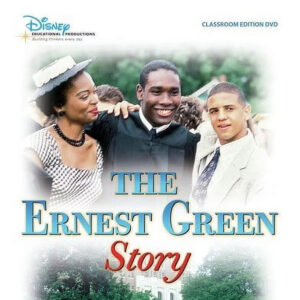 The Ernest Green Story Poster
The Ernest Green Story Poster 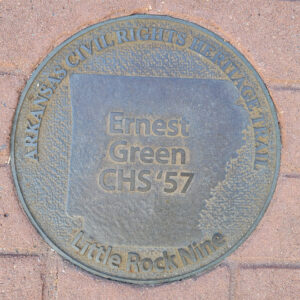 Green Marker
Green Marker 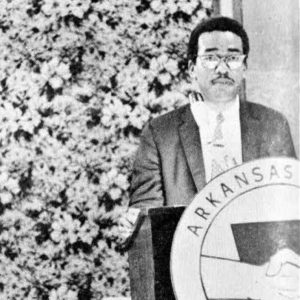 Ernest Green
Ernest Green 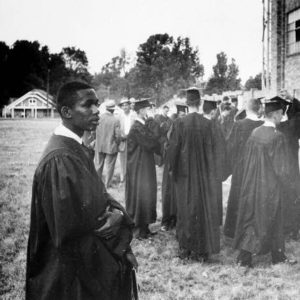 Ernest Green
Ernest Green 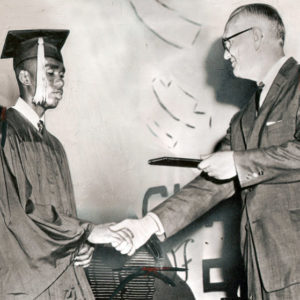 Ernest Green Receives Diploma
Ernest Green Receives Diploma 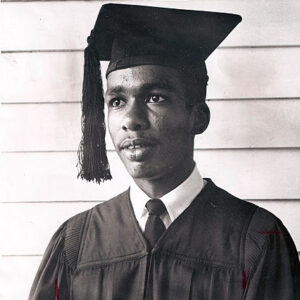 Ernest Green
Ernest Green 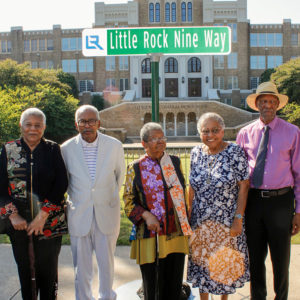 Little Rock Nine Way
Little Rock Nine Way 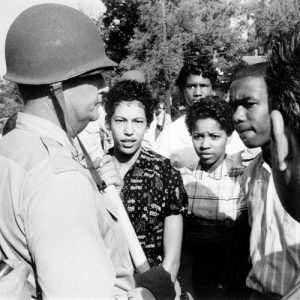 National Guardsman Confronts Students at Central High
National Guardsman Confronts Students at Central High 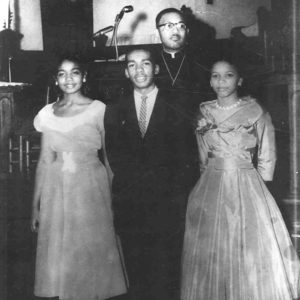 Rufus Young with Little Rock Nine Members
Rufus Young with Little Rock Nine Members 




Inspiration with no words,
a gift that’s been given.
My purpose was not understood,
but now it’s worth living.
I held my head low, feelings of mere shame,
yet the walk you took put my heart in utter shame.
I longed to be great, believed it in all I could…
yet belief has struck me when the movement was for good.
You inspired, you gave hope, you entered on grapes a spoiled fruit.
Tomorrow is today,
I must ground myself to up root.
THANK YOU FOR MY HISTORY